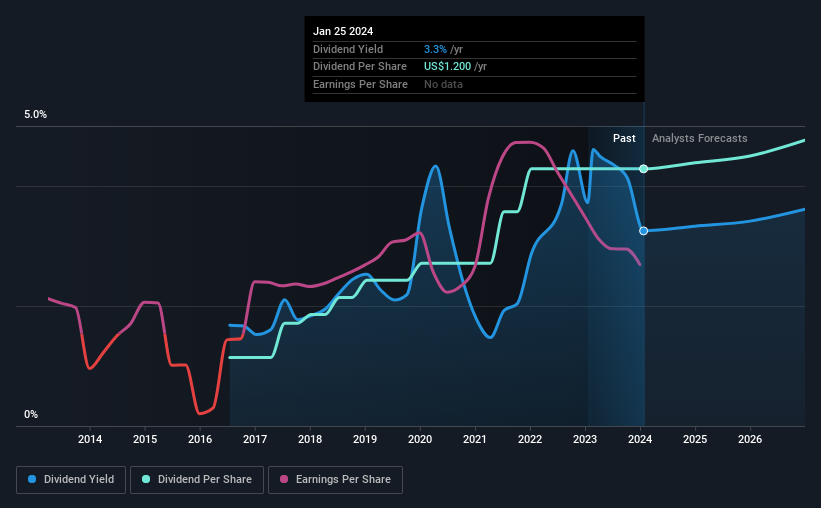Be Sure To Check Out Ally Financial Inc. (NYSE:ALLY) Before It Goes Ex-Dividend
Ally Financial Inc. (NYSE:ALLY) is about to trade ex-dividend in the next 4 days. The ex-dividend date is usually set to be one business day before the record date which is the cut-off date on which you must be present on the company's books as a shareholder in order to receive the dividend. It is important to be aware of the ex-dividend date because any trade on the stock needs to have been settled on or before the record date. Therefore, if you purchase Ally Financial's shares on or after the 31st of January, you won't be eligible to receive the dividend, when it is paid on the 15th of February.
The company's next dividend payment will be US$0.30 per share, on the back of last year when the company paid a total of US$1.20 to shareholders. Based on the last year's worth of payments, Ally Financial has a trailing yield of 3.3% on the current stock price of US$36.90. Dividends are an important source of income to many shareholders, but the health of the business is crucial to maintaining those dividends. So we need to check whether the dividend payments are covered, and if earnings are growing.
View our latest analysis for Ally Financial
If a company pays out more in dividends than it earned, then the dividend might become unsustainable - hardly an ideal situation. Ally Financial paid out a comfortable 33% of its profit last year.
Generally speaking, the lower a company's payout ratios, the more resilient its dividend usually is.
Click here to see the company's payout ratio, plus analyst estimates of its future dividends.
Have Earnings And Dividends Been Growing?
Stocks with flat earnings can still be attractive dividend payers, but it is important to be more conservative with your approach and demand a greater margin for safety when it comes to dividend sustainability. Investors love dividends, so if earnings fall and the dividend is reduced, expect a stock to be sold off heavily at the same time. With that in mind, we're not enthused to see that Ally Financial's earnings per share have remained effectively flat over the past five years. It's better than seeing them drop, certainly, but over the long term, all of the best dividend stocks are able to meaningfully grow their earnings per share.
Many investors will assess a company's dividend performance by evaluating how much the dividend payments have changed over time. In the last eight years, Ally Financial has lifted its dividend by approximately 18% a year on average.
The Bottom Line
From a dividend perspective, should investors buy or avoid Ally Financial? Earnings per share have been flat in recent years, although Ally Financial reinvests more than half its earnings in the business, which could suggest there are some growth projects that have not yet reached fruition. In summary, Ally Financial appears to have some promise as a dividend stock, and we'd suggest taking a closer look at it.
While it's tempting to invest in Ally Financial for the dividends alone, you should always be mindful of the risks involved. To help with this, we've discovered 2 warning signs for Ally Financial that you should be aware of before investing in their shares.
A common investing mistake is buying the first interesting stock you see. Here you can find a full list of high-yield dividend stocks.
Have feedback on this article? Concerned about the content? Get in touch with us directly. Alternatively, email editorial-team (at) simplywallst.com.
This article by Simply Wall St is general in nature. We provide commentary based on historical data and analyst forecasts only using an unbiased methodology and our articles are not intended to be financial advice. It does not constitute a recommendation to buy or sell any stock, and does not take account of your objectives, or your financial situation. We aim to bring you long-term focused analysis driven by fundamental data. Note that our analysis may not factor in the latest price-sensitive company announcements or qualitative material. Simply Wall St has no position in any stocks mentioned.

 Yahoo Finance
Yahoo Finance 
